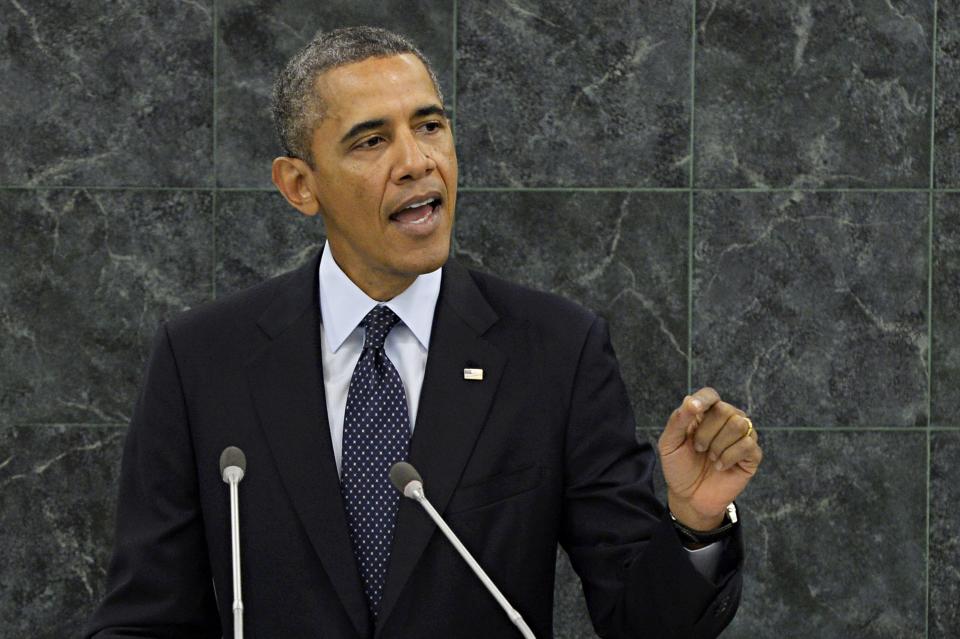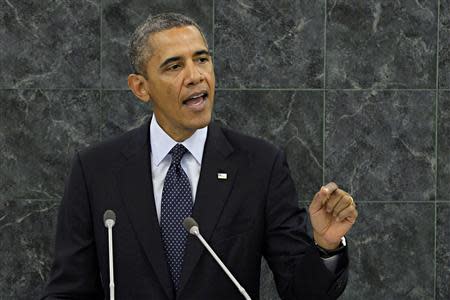Obama pledges diplomacy with Iran; no Rouhani meeting
By Jeff Mason and Yeganeh Torbati UNITED NATIONS (Reuters) - President Barack Obama on Tuesday cautiously embraced overtures from Iran's new president as the basis for a possible nuclear deal, but a failed effort to arrange a simple handshake between the two leaders underscored entrenched distrust that will be hard to overcome. In a speech to the United Nations General Assembly, Obama said he was determined to test President Hassan Rouhani's recent diplomatic gestures and challenged him to take concrete steps toward resolving Iran's long-running nuclear dispute with the West. Hours later, Rouhani used his debut at the world body to pledge Iran's willingness to engage immediately in "time-bound" talks on the nuclear issue but he offered no new concessions and repeated many of Iran's grievances against the United States and the West. In a sign of the difficulties the two countries face in trying to seize a historic opening after decades of hostility, U.S. and Iranian officials were unable to orchestrate a much-anticipated encounter between the leaders on the U.N. sidelines in New York. Even a brief meeting would have been symbolically important given that it would have been the first face-to-face contact between U.S. and Iranian heads of government since before the 1979 Islamic revolution that ousted the U.S.-backed shah. "There will be no meeting," a senior U.S. official said. "We indicated that the two leaders could have had a discussion on the margins if the opportunity presented itself. The Iranians got back to us. It was clear that it was too complicated for them to do that at this time given their own dynamic back home." Rouhani's gestures, including agreement to renew long-stalled talks with world powers on Iran's nuclear program, have raised hopes for a thaw in relations between Washington and Tehran after many years of estrangement. But even as Obama welcomed signs of a "more moderate course" by Iran, Israeli Prime Minister Benjamin Netanyahu said the world should not be fooled by Rouhani's "soothing words." The Israeli leader said Iran was trying to mask its continued quest for a nuclear bomb, something Tehran denies it is seeking. ISRAEL DENOUNCES SPEECH AS 'CYNICAL' After Rouhani's speech, the Israeli leader described the address as a "cynical" attempt to buy time to develop a nuclear- weapons capability. Obama stressed that "conciliatory words" from Iran "will have to be matched by actions that are transparent and verifiable. Differences over Iran's nuclear program and skepticism about Rouhani's intentions, especially from U.S. lawmakers and Israel, a close U.S. ally, have cast doubt on the prospect for any immediate breakthrough between Washington and Tehran. The Jewish state, believed to be the Middle East's only nuclear-armed power, has long threatened military strikes on Iran's nuclear sites if diplomacy fails. Seeking to keep expectations under control, Obama said suspicions between the two countries were too great to believe their troubled history can be overcome overnight. "The roadblocks may prove to be too great but I firmly believe the diplomatic path must be tested," Obama said. Obama suggested, however, that Rouhani's overtures could "offer the basis for a meaningful agreement" to curb Iran's nuclear ambitions and said he had instructed Secretary of State John Kerry to press a diplomatic effort along with other world powers. But Obama stopped short of offering any concessions such as a softening of sanctions that have crippled Iran's economy. For his part, Rouhani said Iran was prepared to work on a framework for managing differences with the United States and said he hoped Obama would show the political will to resist "warmongering pressure groups" on the nuclear issue. At the same time, he denounced sanctions that have been imposed by the United Nations and the West as a violation of human rights. "These sanctions are violent, pure and simple," he said. "Sanctions beyond any and all rhetoric, cause belligerence, warmongering and human suffering." While steering clear of the Holocaust-denial rhetoric that was characteristic of his hardline predecessor, Mahmoud Ahmadinejad, Rouhani leveled a barrage of criticism clearly directed against Israel - without mentioning it by name - denouncing the "brutal repression of the Palestinian people." A senior Obama administration official said in reaction to Rouhani's speech that he had not been as strident as Ahmadinejad but the message was not a surprise. "It's not surprising the Iranian leader would criticize sanctions," he said. OBSTACLES AHEAD While Obama and Rouhani had exchanged courteous letters ahead of the U.N. meeting, all signs point to a tough road ahead as their two countries seek to engage diplomatically. Both men face the risk of domestic criticism if they are perceived to have given too much ground to the other side. Obama had been open to a meeting with Rouhani at the United Nations, but after discussions between aides at a "working level," the Iranians were not ready to have an encounter at the presidential level, U.S. officials said. There had been feverish speculation that Obama and Rouhani might greet each other in passing at a U.N.-hosted luncheon but the Iranian president skipped it. The official reason was because alcohol was served with the meal, according to Press TV, Iran's English-language broadcaster. Iranian media reported earlier, before Obama's aides said the encounter was nixed, that Iranian officials denied having been offered a presidential meeting by the White House. Though Rouhani has said his election was a mandate from Iranians for more moderate policies at home and abroad, hardline conservatives skeptical of any détente with the United States are still dominant in Iran's parliament and military institutions, and the newly elected president might have feared a backlash. A face-to-face meeting would have posed political risks as well for Obama. It could have increased expectations for swift progress and fueled criticism that he is rewarding Rouhani prematurely. In his speech, Obama reaffirmed his pledge that his administration would not tolerate Iran's development of nuclear weapons but avoided repeating his previous assertion that all options are on the table - code for possible military action - in dealing with the Iranian nuclear issue. FRENCH PRESIDENT MEETS ROUHANI French President Francois Hollande became the first Western leader to meet Rouhani on Tuesday after warning that Paris expects "concrete gestures" by Iran to show it will give up a military nuclear program. After a 40-minute meeting, a French aide said the encounter had been polite and courteous, with the two men discussing the crisis in Syria, Lebanon and Iran's nuclear program. Hollande emphasized the need for quick results from the nuclear talks, he said. Obama cited resolving the Iranian nuclear standoff and reaching an Israeli-Palestinian peace deal as his two main Middle-East priorities, efforts he said could help bring stability to the volatile region. Obama appears keen to pursue an opportunity for a major foreign policy achievement while at the same time protecting himself from U.S. conservatives who regard the outreach to Iran as weakness. Obama urged the U.N. Security Council to approve a strong resolution aimed at ensuring Syria keeps its commitments to give up its chemical weapons, and said the United States will provide an additional $340 million in humanitarian aid. Iran is a key ally of Syrian President Bashar al-Assad, a U.S. foe whose country has been torn by civil war since 2011. The White House hopes to counter critics who say Obama's recent decision not to bomb Syria would embolden Tehran in its nuclear defiance. A U.S.-Russian agreement this month aimed at getting control of Syrian chemical weapons after an August 21 poison gas attack in Syria has added momentum to efforts to engage Iran. (Additional reporting by Steve Holland, Arshad Mohammed, David Brunnstrom, John Irish and Louis Charbonneau at the United Nations and Dan Williams and Maayan Lubell in Jerusalem; Writing by Matt Spetalnick and David Brunnstrom; Editing by Jim Loney)


